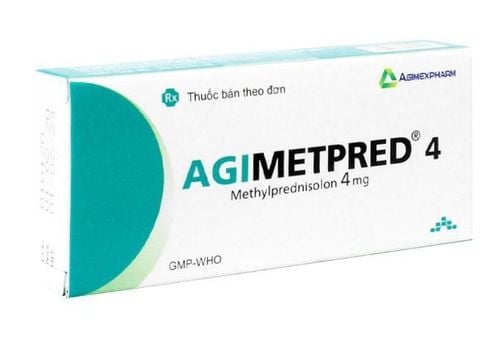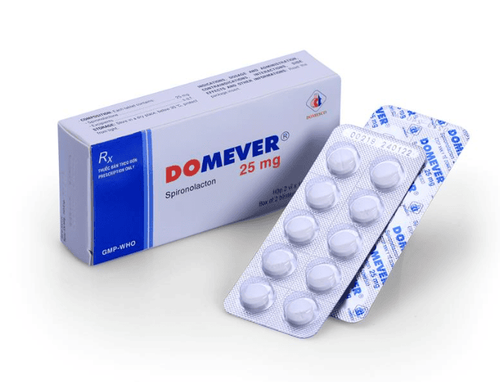This is an automatically translated article.
Agimetpred 4mg is used in the treatment of diseases such as rheumatoid arthritis, systemic lupus erythematosus, nephrotic syndrome, allergies... The main active ingredient of the drug is Methylprednisolone, which acts on the immune system. The solution helps to reduce swelling, itching, redness and allergic reactions.
1. What is Agimetpred?
Agimetpred 4mg is an anti-inflammatory or immunosuppressive drug, indicated in the treatment of a number of diseases caused by allergies, inflammation, hematology, cancer and autoimmune. In addition, the drug is also used in the prevention and treatment of transplant rejection. The main active ingredient in the drug Agimetpred is Methylprednisolone, which is prepared in the form of a tablet with a strength of 4mg.
Indications of the drug Agimetpred 4mg :
Systemic lupus erythematosus , rheumatoid arthritis , sarcoid disease; Some forms of vasculitis, periarteritis nodule, temporal arteritis; Hemolytic anemia, agranulocytosis, acute leukemia, lymphoma, agranulocytosis; Asthma ; Chronic ulcerative colitis; Severe allergies, anaphylaxis; Breast cancer , prostate cancer ; Primary nephrotic syndrome; Contraindications Agimetpred 4mg:
Severe infections, except tuberculous meningitis and septic shock; Hypersensitivity or allergy to the drug's ingredient, Methylprednisolone; Skin diseases caused by viruses, tuberculosis, fungi; Recently injected with live attenuated vaccine ; Systemic fungal infections; Peptic ulcer - duodenal ulcer.

Thuốc Agimetpred 4mg được dùng điều trị một số bệnh liên quan đến dị ứng
2. How to take Agimetpred 4mg
2.1. Dosage: Agimetpred 4mg is taken orally. Dosage in children is based on severity of disease, response to treatment. Once a satisfactory dose is achieved, the dose should be reduced to the lowest level that maintains a clinical response. Consider alternate day therapy if taking it for a long time.
In adults, the initial dose is 6-40 mg/day, depending on the etiology, usually in 4 divided doses. It is possible to apply alternate day therapy: 1 single dose, 2 days/time, taken in the morning.
Treatment of bronchial asthma:
Children < 4 years old (with more than 3 severe asthma attacks/year) and children 5 - 11 years old (at least 2 severe asthma attacks/year): dose 1 - 2 mg/kg/day, dose up to 60 mg/day. Children > 11 years old and adults (with at least 2 severe asthma attacks/year): dose 40-60mg/day orally once or divided into 2 times. May be combined with maintenance doses of long-acting beta2-agonist bronchodilators or inhaled corticosteroids. Short oral corticosteroid therapy for 3-10 days can be maintained until the patient has reached 80% maximal expiratory flow (PEP) and when symptoms have resolved. Reduce oral corticosteroid dose when asthma symptoms are well controlled. Treatment of rheumatoid arthritis:
Dosage 4-6 mg/day. Exacerbation of rheumatoid arthritis use 16-32 mg/day. Taper the dose rapidly as symptoms improve. Chronic arthritis in children with life-threatening complications:
10-30 mg/kg/course, usually 3 times. Chronic ulcerative colitis, severe exacerbations:
Oral dose of 8-24 mg/day. Primary nephrotic syndrome:
Oral dose of 0.8-1.6 mg/kg/day for 6 weeks. Reduce dose gradually over 6-8 weeks.
3. Caution when using Agimetpred 4mg
Caution in the following cases when using Agimetpred 4mg:
Use Agimetpred 4mg with caution in patients with osteoporosis, new vascular connections, hypertension, heart failure, mental disorders, stomach ulcers thick - duodenum, diabetes mellitus; Liver failure, kidney failure, thyroid disease; Glaucoma, cataracts; Elderly: Use low dose and for the shortest time; Acute adrenal insufficiency may occur with abrupt discontinuation of the drug during long-term use or under stress. Taking high doses may affect the effectiveness of the vaccine. Pregnant women: The drug Agimetpred 4mg with the main active ingredient is Methylprednisolone used orally, with systemic effects, so when used, it can lead to a slight decrease in the weight of the baby at birth. Therefore, it is necessary to weigh the benefits achieved with the possible risks to the mother and fetus when using the drug in pregnant women. Agimetpred is excreted in human milk and should be used with caution in lactating women.

Thuốc Agimetpred 4mg cần được sử dụng theo chỉ định của bác sĩ
4. Undesirable effects
Undesirable effects often occur when taking high doses of Agimetpred 4mg for a long time. Side effects include:
Central nervous system: Insomnia, agitation, dizziness, psychosis, convulsions, delirium, hallucinations, mood swings; Digestive: Indigestion, gastric ulcer, nausea, vomiting, abdominal distension, increased appetite; Skin: Hirsutism, skin atrophy, hyperpigmentation; Endocrine and metabolic: Cushing's syndrome, pituitary-adrenal axis suppression, glucose intolerance, hyperglycemia, hypokalemia, alkalosis, sodium and water retention; Nervous - muscle and bone: Osteoporosis, joint pain, muscle weakness; Eye diseases: Cataracts, glaucoma; Cardiovascular: Edema, hypertension. When indicated for acute treatment, use the drug at the lowest dose and for the shortest duration that achieves clinical effect.
After long-term drug treatment, the pituitary-adrenal axis may be suppressed, it is necessary to reduce the drug dose gradually instead of stopping abruptly. It is best to take Agimetpred 4mg as a single dose in the morning after eating, this way to limit side effects than taking many times a day. Alternating therapy is also a good way to minimize adrenal suppression and other side effects.
During drug use, it is necessary to monitor and periodically evaluate parameters of bone formation, blood count, glucose tolerance and hypertension...
Prophylaxis of gastric and duodenal ulcers with receptor antagonists H2 - histamine when taking the drug in high doses.
Calcium supplementation is required for the prevention of osteoporosis in all patients taking long-term medication.
Patients taking Agimetpred 4mg are likely to be immunosuppressed, need to be warned about the potential for infection.
5. Drug interactions
Possible drug interactions when co-administered with Agimetpred 4mg include:
Methylprednisolone in Agimetpred 4mg is an inducer of cytochrome P450 enzyme, a substrate of P450 3A enzyme, so this drug affects metabolism. of Phenobarbital, Phenytoin, Carbamazepine, Ciclosporin, Erythromycin, Ketoconazole, Rifampicin; Phenytoin, Phenobarbital, Rifampin and diuretics may decrease the effectiveness of Methylprednisolone; Insulin : Use higher insulin doses when used concurrently with the drug, because Methylprednisolone can cause hyperglycemia. Above is information to help you understand what Agimetpred 4mg is and the notes when using it. To ensure safety for health and maximize the effectiveness of treatment, the use of drugs must follow the instructions of a qualified doctor.
Please dial HOTLINE for more information or register for an appointment HERE. Download MyVinmec app to make appointments faster and to manage your bookings easily.













